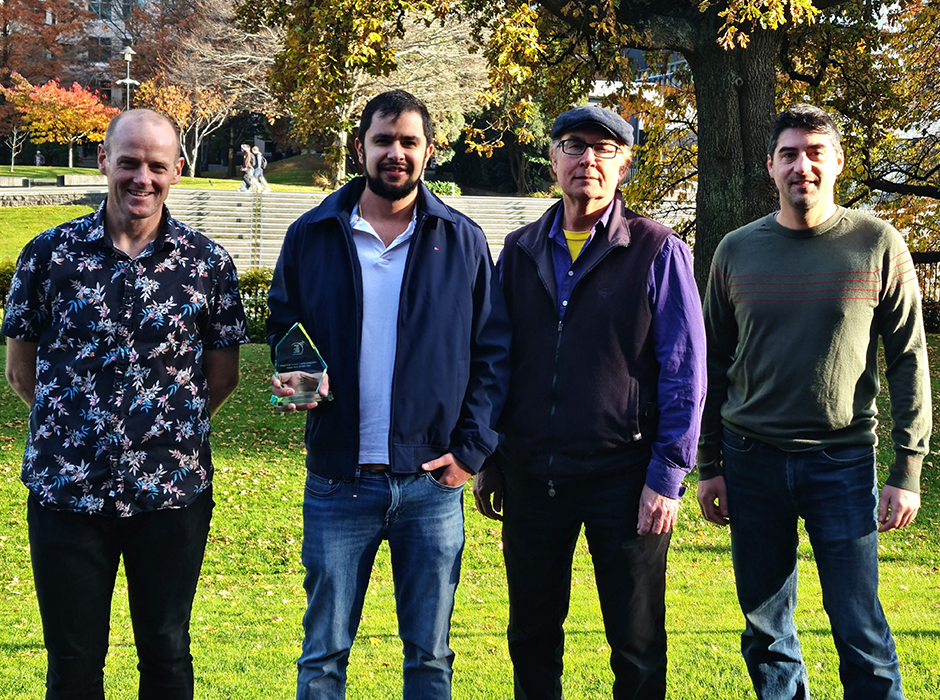
Space for Planet Earth Challenge winners are, from left, Associate Professor Grant Dick, PhD candidate Cristhian Camilo Delgado Fajardo, Professor Peter Whigham and Associate Professor Pascal Sirguey.
An innovative approach has helped an Otago team land first place in the Space for Planet Earth Challenge.
The challenge has two category winners – a university/startup level and a high school level – and is open to individuals and teams in New Zealand, Australia and the Pacific Islands. It aims to use space technologies to find new and innovative solutions to address climate change issues in Australasia.
Taking out the university/startup category for Otago was a team from the School of Computing and the School of Surveying led by PhD candidate Cristhian Camilo Delgado Fajardo and supported by Professor Peter Whigham, Associate Professor Grant Dick and Associate Professor Pascal Sirguey.
Their project, "Satellite-based AI Emulators for Efficient Monitoring of Agricultural Methane Emission", looked at how methane emission monitoring could be enhanced by using satellite data and artificial intelligence algorithms.
Cristhian, who is in the third year of his PhD, says the project fit well with his own research topic – Hybrid modeling: combining artificial intelligence with mechanistic models to improve greenhouse gases estimations from remote sensing data.
“We saw the Space for Planet Earth Challenge as a unique opportunity to leverage space technologies for addressing environmental challenges, particularly in monitoring methane emissions from agricultural activities. This topic was perfectly aligned with my PhD, so we saw a valuable opportunity to get training, support and do networking.”
Cristhian’s primary supervisor Peter says the project was very much led and powered by Cristhian, who deserves the lion-share of credit for the win.
“I want to emphasise that the majority of the work, and the original motivation to compete in the challenge, was due to Cristhian. It was a remarkable effort and he showed tremendous leadership throughout.”
The team is “thrilled and honoured” to have won the award, which Cristhian says has motivated them to continue their work in addressing environmental challenges through innovative research and technology.
“Our project won due to its innovative approach – combining advanced satellite technology with AI to tackle a pressing environmental issue. The judges appreciated our comprehensive methodology, the showcasing prototypes, and its potential impact. The fact that our initiative could be easily transferrable to newer satellites, like methaneSAT, makes it very attractive,” Cristhian says.
"Winning this award validates our research efforts and may open up new opportunities for collaboration and further advancements in environmental monitoring technologies."
The win comes with $25,000 and six months of mentorship from SpaceBase, which the team is utilising to enhance their project, focusing on refining their satellite-based AI emulators and expanding their capabilities in efficiently monitoring agricultural methane emissions.
They have also made “significant progress” in their collaboration discussions with representatives from NIWA, GHGSat, and MethaneSAT, and recently presented their groundbreaking work at the Machine Intelligence for GeoAnalytics and Remote Sensing (MIGARS) 2024 conference.
More about the Space for Planet Earth Challenge
– Kōrero by Internal Communications Adviser Laura Hewson